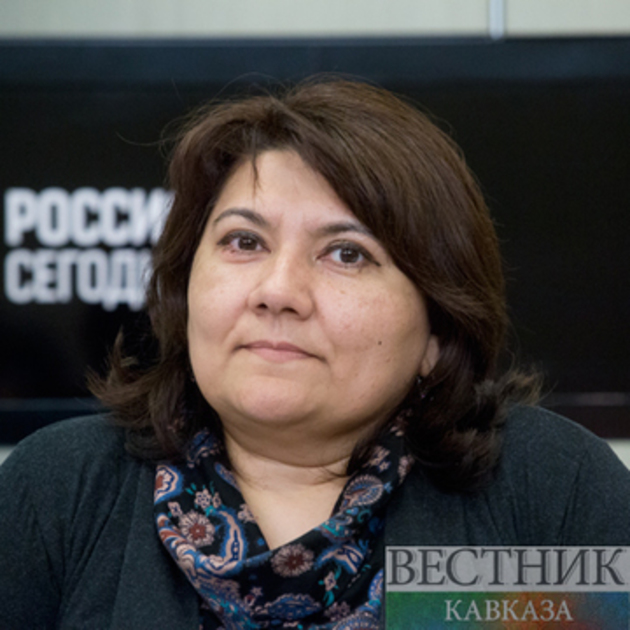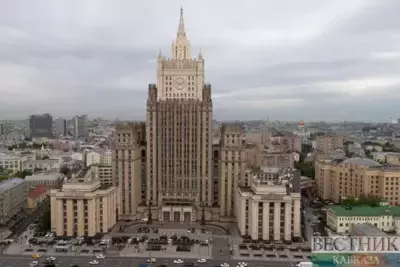The official visit to Moscow of the speaker of the upper house of the Tajik parliament Rustam Emomali, which took place on November 24, again updated the topic of the republic's possible entry into the Eurasian Economic Union in the information space. Zarina Dadabaeva, a leading researcher at the Institute of Economics of the Russian Academy of Sciences, professor of the Russian State Humanitarian University, Doctor of Political Sciences, spoke about how real such prospects are.
- Zarina, how is the current position of the Republic of Tajikistan on interaction with the EAEU formulated? Has it changed recently in the direction of possible acceleration and deepening of the process?
- The position of Tajikistan on this issue, in my opinion, is the same. It has not changed since 2015, when the Eurasian Economic Union began to function fully. President of Tajikistan Emomali Rahmon has repeatedly stated: the republic and the EAEU countries are linked by close friendly relations, multifaceted ties are effectively developing between them within the framework of integration associations in the Eurasian space (we are talking primarily about the CIS and the CSTO), but as a matter of priority - in a bilateral format.
In May 2019, Emomali Rahmon took part in a meeting of the Supreme Eurasian Economic Council in Nur-Sultan. An analysis of his speech and the speeches of Tajik officials testifies to a rather benevolent tone in discussing the prospects for economic and political interaction with the EAEU member states. But, I will stress once again, precisely at the bilateral level.
At the same time, it is difficult to single out an unambiguous official position on multilateral cooperation and the possible entry of the Republic of Tajikistan into the EAEU. It is stated that a special interdepartmental commission has been created in the republic to study the risks and benefits of such integration, but it is extremely difficult to find information on the conclusions of this commission.
As for ordinary citizens, the conducted polls show that the majority of the population of Tajikistan is in favor of joining the Union. And the main role here is played, of course, by the prospect of improving the situation of labor migrants in Tajikistan, who in this case will acquire equal rights with citizens of other member states of the association in the common EAEU market.
But, in my opinion, Tajikistan feels quite comfortable in its current status, when interaction with the EAEU countries is formed mainly through the development of bilateral trade and economic ties and, mainly, with two partners - Russia and Kazakhstan.
The trade structure of the republic is largely based on the import of those products, without which it is difficult to implement the course of industrialization of the economy declared in the National Development Strategy of the Republic of Tajikistan for the period up to 2030. But the share of the EAEU countries in the republic's foreign trade turnover is uneven. For example, in 2019, Tajikistan carried out its main export-import operations mainly with Russia (approximately 23.3% of the total foreign trade turnover) and with Kazakhstan (21.2%). Kyrgyzstan is in 10th place in this rating with 1.4%, Armenia and Belarus are minimally represented in the republic's foreign trade turnover.
Therefore, I think that it is premature to speak about the prospects for accelerating integration. There is no movement towards the Union as a whole in the republic.
Perhaps the official visit of Rustam Emomali to Russia could be viewed as a preliminary "sounding of the soil", but in reality this issue was not included in the agenda. Moreover, the discussion of the situation of Tajik labor migrants as a separate item in negotiations with Russian officials suggests that the Tajik authorities intend to solve this problem without joining the EAEU.
Yes, the visit has resumed discussion of this issue in the expert environment and in the media. But nothing more. Tajikistan, like some of its neighbors in the region, is in no hurry to apply for membership in the EAEU. Even the fact that Uzbekistan, the closest neighbor and, more recently, a friendly partner of the Republic of Tajikistan, acquired the status of an observer in the organization, did not influence the adoption of a similar decision by Tajikistan.
- Nevertheless, from an objective standpoint, is the full membership of Tajikistan in the EAEU beneficial for the republic itself and for the Union?
- Objectively, for Tajikistan, joining the EAEU is beneficial. This will help to solve a number of significant problems for a small and economically weak country, will contribute to a more efficient use of rich reserves of raw materials and thereby ensure the economic stability of the republic.
Here I would single out several directions.
The first, of course, is migration. Namely, strengthening the status in the recipient countries and creating more favorable conditions for labor migrants in terms of their social protection and pensions. This will reduce the pressure on the national economy, will help to reduce unemployment, reduce poverty and solve demographic problems. After all, a significant part of the economically active population of Tajikistan not only leaves for work in Russia, Kazakhstan and Belarus, but also acts as a tangible resource for revenues to the budget of Tajikistan due to remittances, whose share in some periods reached 48% of GDP. And it is remittances, which are the main source of income for many families, that spur domestic demand for goods produced in Tajikistan itself.
A positive example is the preferential treatment of Kyrgyz labor migrants, whose number in the EAEU states has multiplied after Kyrgyzstan's accession to the Union.
The second direction - the development of human resources and education - is closely related to the first. The same labor migrants acquire the skills and qualifications that are in demand in the EAEU market, and their children gain access to quality education. Taken together, if they return to their homeland, this can lead to an improvement in the economic condition of Tajikistan through the infusion of more qualified personnel into the country's economy.
The aspect of access to new technologies in various fields of activity, from agricultural to industrial, is also important. In modern conditions, small countries need help in the transition to digital platforms, in the development of modern means of communication, in the provision of advanced methods of mining in difficult mountain conditions typical for Tajikistan. This is very important for the republic, and there are such technologies in Russia and Kazakhstan.
The next area is investment. Attracting reliable regional investors to the country, primarily Russian and Kazakh, aimed at developing the real sector of the economy, will lead to an increase in production and an increase in the export of goods. Such investors, who will not demand to pay off part of the territories for debts, will not put forward conditions under which some of the investments will strangely end up in the accounts of companies from the same countries.
In addition, joining the EAEU will provide an opportunity for Tajikistan to freely import goods from Russia, Kazakhstan and Belarus, and eliminate the existing customs barriers in the export of Tajik agricultural products, which now cross three borders. But just this aspect causes controversial opinions on the part of Tajik experts, who, on the one hand, want to have access to the large Eurasian market, and on the other hand, do not want to lose customs profits.
Potentially for Tajikistan, a big plus from closer interaction with the EAEU states is in the energy sector. The development of its potential with competent management will allow providing cheap and clean electricity to the inland and southern parts of Eurasia. Of all the post-Soviet countries of Central Asia, Tajikistan, along with Kyrgyzstan, has significant hydropower potential.
As for the EAEU bonuses, the expansion of the organization due to a not very strong economy with many unresolved social and economic problems in the short term will not bring the Union any tangible positive effect. This can entail significant financial costs for the current members, to a greater extent - for Russia and Kazakhstan as the locomotives of the organization.
The advantages in this context include the possibility of diversifying logistics routes to Southeast Asia, access to Afghanistan. Tajikistan is already selling electricity to the IRA, perhaps, Kyrgyzstan could join this, the development of minerals here, in particular uranium and lithium, is also potentially interesting.
- What other constraining circumstances are there for Tajikistan's full membership in the EAEU?
- The expediency of the rapid expansion of the EAEU due to a larger number of members raises many questions from both Russian and Tajik experts. The republic's official authorities are not ready to openly and frankly discuss this issue. The rhetoric on him is vague in the East.
In Tajikistan, they understand that along with the advantages of integration, there will be disadvantages. On the downside, I would include a possible reduction in the re-export of Chinese and Turkish goods, which are a source of income for small entrepreneurs, a possible rise in prices for many groups of goods and a decrease in trade in the domestic market due to the low competitiveness of local producers. The result is a decrease in income.
In this context, a simple example can be cited: as relations with Uzbekistan improved, the turnover of Tajikistan with Uzbek producers increased. As a result, Uzbek chicken eggs were supplied at a lower price, which reduced the demand for local products. Therefore, the authorities were forced to impose a ban on the import of these products from Uzbekistan.
Another risk is possible losses from the collection of customs duties, another significant source of replenishment of the state treasury.
The introduction of uniform tariff rates may entail an increase in consumer losses. Since the country's market is saturated mainly with imported goods, the population will be forced to pay more for them.
And finally, accession to the EAEU may become a "pain point" in a noticeable reduction in donor assistance from international organizations and investments from "third countries", especially from China.
In 2019, out of the total amount of $ 346 million of foreign investments received by Tajikistan, Chinese investments amounted to 263 million.In terms of invested funds over the past several years, it was in second place after Russia, and in 2019 it came out on top. In the same year, Russian investments amounted to only $ 33.1 million. But there are problems here: the investment environment that has developed in Tajikistan is not very favorable for Russian investors, and, unfortunately, they are gradually leaving the republic.
I would also include delicate political moments as restraining factors. As already mentioned, Tajikistan is a small and economically weak country for which the support of the world community is extremely important. It is clear that the republic fears to lose this support in the event of joining the EAEU. In the context of the so-called "multi-vector policy" pursued by Tajikistan, the republic greatly values political friendship and economic assistance from the EU and the United States, which may "not like" the steps towards close integration with the EAEU countries.
All this confirms: while Tajikistan is not ready to join the integration organization. The republic sees more advantages in its current status, which provides a freer conduct of foreign policy, taking into account the country's position in Central Asia, more opportunities to independently form its foreign economic and foreign trade policy without restrictions from the outside, in particular, without common customs rules.
















